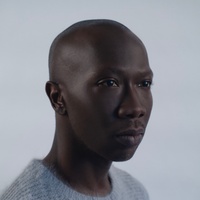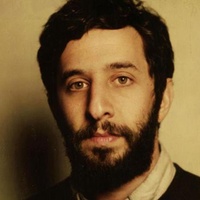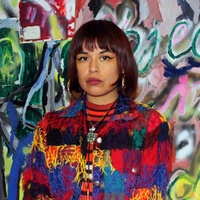As told to T. Cole Rachel, 2485 words.
Tags: Podcasts, Music, Inspiration, Process, Adversity, Beginnings.
On learning, listening, and always moving forward
Podcaster, writer, and musician boice-Terrel Allen on the origins of his long-running podcast, not letting fear get in the way of trying new things, and what you can learn from really listening to other people.Your podcast touches on the subject of music through a number of different perspectives. What was the original impetus for starting it?
Well, I love podcasts. I love music. So it seemed sort of natural. In the beginning what happened was that I saw that there was a place in Manhattan having a workshop on public access television, which was interesting to me because I had always wanted to do a talk show. There were two workshops, one in the afternoon and the one at night, and I decided to go to the afternoon one. I was unemployed at the time and kind of in a depression and I woke up for it and I just felt like, “You’ve never done a podcast before. You’ve never done a talk show before. You don’t know how to do this.”
I didn’t go and then I felt really horrible, so I made sure to get myself together and I went to the next one. I realized there’s all these moving parts involved with doing a TV show, even for public access, and you have someone to shoot it. Then there’s months of classes you take and they train you so you can get certified. As I was sitting there listening, I started to think about doing a podcast instead, since it was something I could do on my own.
I knew that I loved music and I loved long-form interviews, so it made sense to combine the two. I liked listening to someone like Marc Maron. He’s coming from the area of comedy, but even if you don’t know the comic he’s talking to, it doesn’t really matter. You still enjoy the interview. Music is my passion, so why not do a podcast about that? I can interview people connected to music, which really opens it up. Not just people that play music, but also music journalists, music therapists, and whatnot. You give people a space to tell their story. Some people want to talk about more personal things, other people want to talk about technical things, but it’s all under this umbrella of music. So that was the beginning, which was about five years ago.
There is such a podcast boom now—and so many more resources available for starting one—but how did you learn all that technical podcast stuff when you were first starting out?
I was just Googling away. I reached out to podcasting experts. There’s an app I use called Bossjock and it was created by somebody I actually knew from Pittsburgh, where I’m from, so I contacted him and he sent me tips. You know, there’s all this research you can do, but at some point you actually just have to do it.
Sometimes you can get mired in the research like, “Ok, now I know everything about podcasting and what to do,” but then you’ve got to pull the trigger and actually do it. There was a point when I was planning it that I felt myself getting scared. And again, I’m like, “Okay, well the website needs to be better. Okay, well I’ve just got to tweak this a little bit and then I’ll be ready.” At a certain point I recognized that it was just me getting scared. So my advice is to set a deadline and abide by that deadline.
When you first started, how were you finding the people to interview?
It was a lot of people I knew. I knew some musicians, so I would contact them. The first guest was somebody I knew from my hometown outside of Pittsburgh. I went to her apartment in Jersey and I was just terrified. I had my notes and my interview questions all ready. So I go out to Jersey—it’s like a 15 minute walk from a bus station—and I knock on her door and there’s no answer. I was almost relieved that there was no answer. I get to the interview and then I’m like, “Okay, now I’ll know to get someone’s phone number beforehand.” I’m like, what am I doing? I don’t even have a phone number! So I messaged her on Facebook and then she comes to the door. She didn’t hear the doorbell ringing and I was like, “Now I have to do this.” I asked my first question and then I just did the rest of the interview without looking down at my notes. It was a lesson.
That’s a funny thing about interviewing. You need to be prepared, but you have to be able to go with the flow, too. You can’t let preparedness get in your way. I know that in addition to the podcasts that you’re also a writer and a musician. How do these different pursuits inform each other?
Well, I think about it with my books. In fiction you think about plots and beginnings, middles, endings, and those types of things. I didn’t realize when I started doing the interviews that those things would also occur. The first question is sort of like the prologue and warms things up, then you’re telling someone’s story and you’re moving through the plot, and then you can take little turns off the road—and that’s okay as long as you get back on the road eventually—and you’re going to the end, which is usually whatever their new project is. Having an understanding of music, both as a listener and as someone who makes music, really helps.
You have a nice traveling setup for doing your podcast—it’s like an entire portable studio packed in a suitcase.
Yes! I’ve actually had the same equipment from the beginning, but I used to have it all in a duffle bag, which was crazy. One of my guests was like, “You need something you can pull behind you.” It started out as a temporary thing, but ended up being a permanent way of working. At the time I started I was living in Stuytown in Manhattan with a roommate. It was supposed to be a temporary situation, but I ended up there—sleeping on a futon—for a long time, mired in my depression. When I wanted to start the podcast I didn’t have anywhere to record. I couldn’t have people come there because there was no room, so I would go to my guests, which I didn’t know at the time would be a wonderful thing to offer to interviewees—the idea that I can come to you. I think a lot of interviewees liked the comfort of not having to leave home to do the interview. If someone is passing through town, I can interview them at their hotel or at their friend’s places, or at venues or rehearsal spaces. I’ve done interviews everywhere.
How has the process changed since you started? What kinds of things have you learned?
Well, I was very scared of learning the new equipment. I think it was one of the things that I dragged my feet on, but I realized from the beginning I never wanted to do the actual audio editing, so I have to listen to each show and send the time codes to my editor, who cuts things up and puts it together for me. I knew from the beginning that if the audio editing was going to slow me down, then I shouldn’t worry about trying to do that. So I found an audio editor and I’ve been with him for five years. I don’t know how to do that. I know it’s going to slow me down, so I’ll find someone else who can do it and give me a show in a 24-hour turnaround period.
Having done this for so long now, what keeps you going?
In my real life I don’t like small talk or chit chat, so it’s interesting to do these long-form interviews. I’m curious about what people have to say. And I think I’ve grown because in every interview I hear something that inspires me in some way. I need to hear whatever they’re saying. No one is being forced to go into music, you know? You don’t do it unless it’s a passion. So whether you’re a Grammy winner and that’s your full-time gig or you have to go to your 9-5 job, you still had to fight to do this. That inspires me to keep going.
In the same way, you may not have a lot of money from doing the podcasting, but if you have something that just keeps you going, that’s enough. For me, I meet all these fascinating people. I get to hear their stories in a way that you wouldn’t get in just a casual conversation. Then I get to see and hear all of this great art and see all of these amazing shows, so it constantly inspires me. The thing I hear over and over from people is that it’s never easy, but you can’t give up.
You are about to publish your 200th interview. As someone who has been doing this for a while now, what do you think about the landscape of podcasts? There are so many now. Everyone has a podcast.
It really just hit me a few days ago that I was coming up on 200 podcasts. It’s wild to think you’ve done something like this 200 times, you know? And it’s wild that there are so many podcasts now, but it seems like there is room for everyone. I think a good interview can be an art form. A good interview is about listening, not talking. You can’t have a great conversation if you are stepping all over the person you’re talking to. So, personally, I like to see people who take this whole thing very seriously, as an art form. My advice—and my goal, always—is just to create great content. I’ve always kept that in the back of my mind. If I just keep making shows and keep trying to get better and I talk to people who are excited to have a conversation about this kind of stuff, then something good will arise from it. Because of my podcast I ended up doing The Strand’s podcast. I’ve gotten gigs with 33 ⅓. All of these things came from just consistently putting out a product that not only am I not ashamed of, but that I’m actually proud of.
Any other advice for the novice podcaster?
Go in the direction of something you love to do and that you already have an interest in. I think that’s the best thing. Study podcasts that you admire and consider what you like about them and don’t like about them. Do your research. At some point consider—What makes a good interview? What makes it bad? So if I’m listening to an interview, I’m like, “How did they ask that difficult question?” Or, “Okay this person is not talking much, how are they handling that?” Study those things—the nuts and bolts of it. And there are books that you can read and resources online, but eventually you just have to do it. I’m big on setting deadlines and keeping those deadlines. My original personal deadline was my birthday. I was going to start a podcast and that was going to be my birthday gift to myself.
Also, it’s important not to get mired in all this stuff that you don’t really need. You don’t need $500 microphones or a ton of expensive equipment. Start with something smaller. I’m still using the same mics that I had in the beginning. I think they were about $75 each or something like that. I’ve had them all five years. I haven’t had to replace them. Other than replacing some cables and getting new headphones, I haven’t needed to change much. Don’t think, “Oh, I gotta have this $3,000 thing and then I’ll do it.” A lot of times that’s just fear talking. The researching, not setting deadlines, making excuses. It’s just fear and you’re scared to actually do it.
Just do it.
Yeah. I totally believe in that. You know, the road doing it isn’t going to be easy at times, but if it’s something you really like, that’s what can keep you motivated. Maybe no one is listening, especially at first. That could happen. Or you may have a bad interview sometimes. You can’t judge yourself too harshly for that. Not every piece is going to be amazing. I look at it like this: there’s gold interviews, silver interviews, and bronze interviews. You want to have as many gold interviews as possible. That’s great. But I’m not beating myself up for the bronze ones. I can listen to those shows and learn from them. I can be like, “Ah, okay. I see why that worked and that didn’t work.” Then you move on to the next one. You keep going.
boice-Terrel Allen Recommends:
Sound Opinions: Every Friday I look forward to the latest episode of this Chicago-based show featuring music critics Jim DeRogatis and Greg Kot. Originally airing on WBEZ-FM public radio, this is my favorite music show and features genre-spanning interviews, reviews, and performances. It comes from the perspective of two critics who are sharing what they’re passionate about and even when they don’t like something they’re never cynical or mean-spirited.
Oprah’s Supersoul Conversations: The one and only Oprah is the reason why I always wanted to have a talk show since I was a kid. She’s the reigning Queen of Talk for a reason. Her ability to connect with her guests is unparalleled. This show features conversations with spiritual leaders and people with inspirational life stories. It’s my weekly dose of inspiration.
WTF with Marc Maron: One of the interview masters! I’ve been a fan for the past 6 years. Although I don’t follow the comedy scene, Marc showed me that you don’t have to be familiar with a guest if the interview is interesting and that a good conversation will make you seek out their work after the fact.
Fresh Air: Terry Gross is another one of the interview greats. Her interviews are a masterclass in not only how to ask a question, but also how to listen. Also of note, fill-in host Dave Davies is quite spectacular himself.
A Kiki from the Cancer Ward with Sir Ari Gold: This is the first podcast that I’ve produced for someone else. It’s a series of conversations that pop singer Ari recorded in the cancer ward while he battled ACL (Acute Myeloid Leukemia). Ari leads sometimes funny, sometimes sad long-form interviews with famous friends like Colman Domingo and Laverne Cox. Ari is an engaging conversationalist and even if I wasn’t involved, I would still listen to his show.




